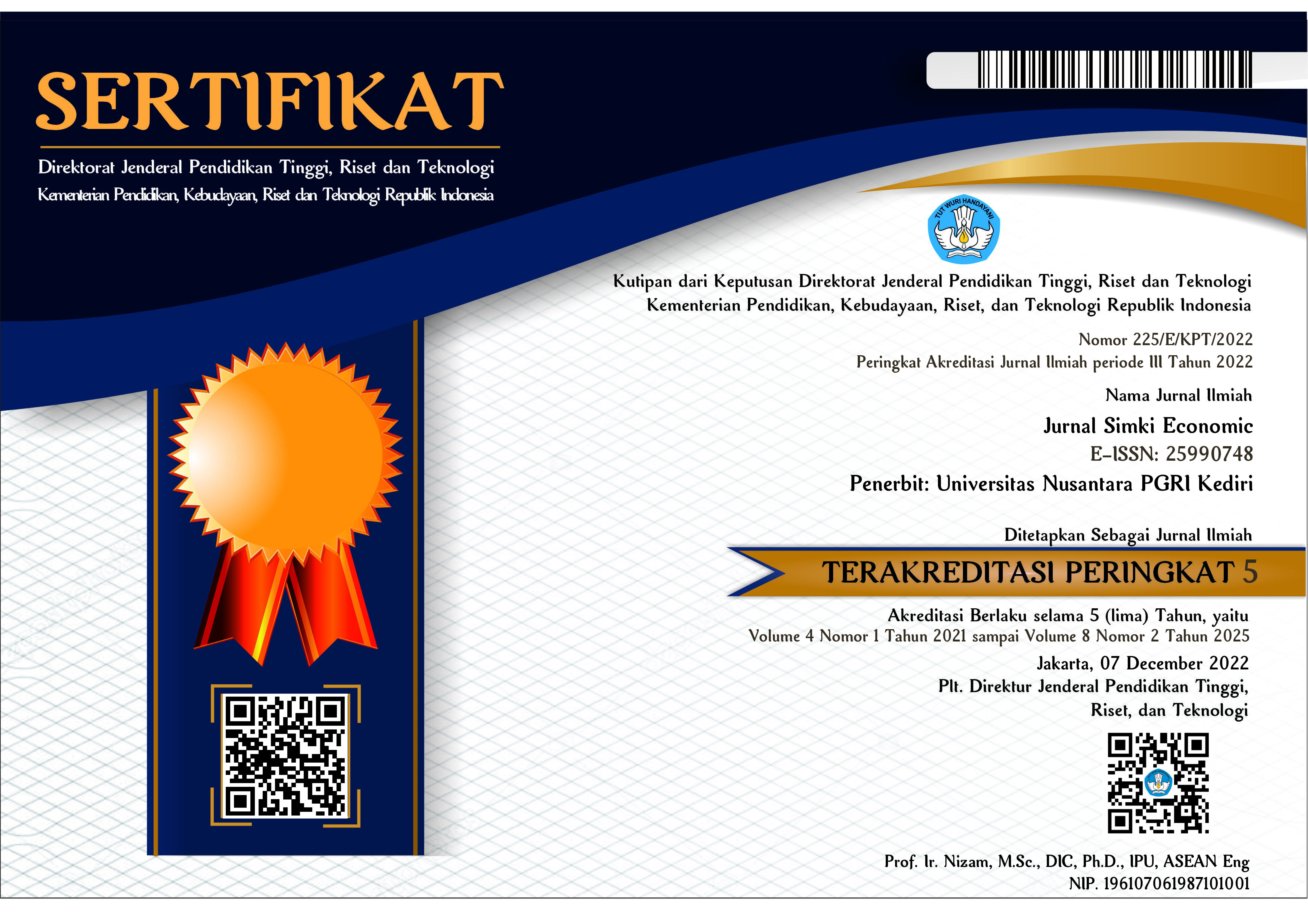Pengaruh Kualitas Informasi Media Sosial dan Kepercayaan terhadap Niat Berkunjung Wisatawan di Kota Makassar, Indonesia
 Abstract views: 1817
,
Abstract views: 1817
,
 PDF (Bahasa Indonesia) downloads: 813
PDF (Bahasa Indonesia) downloads: 813
Abstract
Social media information asymmetry has been viewed as an essential resource for travelers seeking out travel information. The purpose of this study is to determine how social media’s informational quality and trust affect travelers' intentions. Testing utilizing multiple regression analysis was conducted on 100 visitors to well-known tourist destinations in Makassar City, South Sulawesi, Indonesia. Using a questionnaire, data was gathered over the course of about two months. Empirical results show that social media information quality and trust positively influence tourist travel intentions in Makassar City. This study investigates the mechanisms by which the level of content that tourists create influences their trip intentions, which is advantageous for tourism management and marketing.
Downloads
References
Al-Saedi, K., Al-Emran, M., Ramayah, T., & Abusham, E. (2020). Developing a general extended UTAUT model for M-payment adoption. Technology in Society, 62. https://doi.org/10.1016/j.techsoc.2020.101293
Bahari, A. F., & Ashoer, M. (2018). Pengaruh Budaya, Sosial, Pribadi Dan Psikologis Terhadap Keputusan Pembelian Konsumen Ekowisata. Jurnal Minds: Manajemen Ide Dan Inspirasi, 5(1), 68–78. https://doi.org/10.24252/minds.v5i1.4839
Blasco-Lopez, F., Recuero Virto, N., Aldas Manzano, J., & Cruz Delgado, D. (2019). Facebook’s power: factors influencing followers’ visit intentions. Spanish Journal of Marketing - ESIC, 23(1), 95–117. https://doi.org/10.1108/SJME-06-2018-0032
Burgess, S., Sellitto, C., Cox, C., & Buultjens, J. (2011). Trust perceptions of online travel information by different content creators: Some social and legal implications. In Information Systems Frontiers (Vol. 13, pp. 221–235). https://doi.org/10.1007/s10796-009-9192-x
Camilleri, M. A. (2018). The Tourism Industry: An Overview. In Travel Marketing, Tourism Economics and the Airline Product (pp. 3–27). Springer International Publishing. https://doi.org/10.1007/978-3-319-49849-2_1
Chakraborty, U., & Bhat, S. (2018). Credibility of online reviews and its impact on brand image. Management Research Review, 41(1), 148–164. https://doi.org/10.1108/MRR-06-2017-0173
Chen, S., & Dhillon, G. (2003). Interpreting Dimensions of Consumer Trust in E-Commerce. Information Technology and Management, 4(2/3), 303–318. https://doi.org/10.1023/A:1022962631249
Dedeoglu, B. B. (2019). Are information quality and source credibility really important for shared content on social media?: The moderating role of gender. International Journal of Contemporary Hospitality Management, 31(1), 513–534. https://doi.org/10.1108/IJCHM-10-2017-0691
Doosti, S., Jalilvand, M. R., Asadi, A., Khazaei Pool, J., & Mehrani Adl, P. (2016). Analyzing the influence of electronic word of mouth on visit intention: the mediating role of tourists’ attitude and city image. International Journal of Tourism Cities, 2(2), 137–148. https://doi.org/10.1108/IJTC-12-2015-0031
Flores-Ruiz, D., Elizondo-Salto, A., & Barroso-González, M. D. L. O. (2021). Using social media in tourist sentiment analysis: A case study of andalusia during the Covid-19 pandemic. Sustainability (Switzerland), 13(7). https://doi.org/10.3390/SU13073836
Jung, Y. M. (2019). Data analysis in quantitative research. In Handbook of Research Methods in Health Social Sciences (pp. 955–969). Springer Singapore. https://doi.org/10.1007/978-981-10-5251-4_109
Kemp, S. (2023). Digital 2023: Indonesia. Retrieved from https://datareportal.com/reports/digital-2023-indonesia
Kim, D. J., Ferrin, D. L., & Rao, H. R. (2008). A trust-based consumer decision-making model in electronic commerce: The role of trust, perceived risk, and their antecedents. Decision Support Systems, 44(2), 544–564. https://doi.org/10.1016/j.dss.2007.07.001
Lamberton, C., & Stephen, A. (2016). A thematic exploration of digital, social media, and mobile marketing research’s evolution from 2000 to 2015 and an agenda for future research. Journal of Marketing, 80(6), 146–172. https://doi.org/10.1509/jm.15.0415
Sekaran, U., & Bougie, R. (2016). Research methods for business : a skill-building approach. Wiley. Retrieved from https://www.wiley.com/en-us/Research+Methods+For+Business%3A+A+Skill+Building+Approach%2C+7th+Edition-p-9781119266846
Viñán-Ludeña, M. S., & de Campos, L. M. (2022). Discovering a tourism destination with social media data: BERT-based sentiment analysis. Journal of Hospitality and Tourism Technology, 13(5), 907–921. https://doi.org/10.1108/JHTT-09-2021-0259
Wang, H., & Yan, J. (2022). Effects of social media tourism information quality on destination travel intention: Mediation effect of self-congruity and trust. Frontiers in Psychology, 13, 7985. https://doi.org/10.3389/fpsyg.2022.1049149
Copyright (c) 2023 Achmad Zulkarnain Zaenal, Zaenal Arifin Sahabuddin

This work is licensed under a Creative Commons Attribution 4.0 International License.














